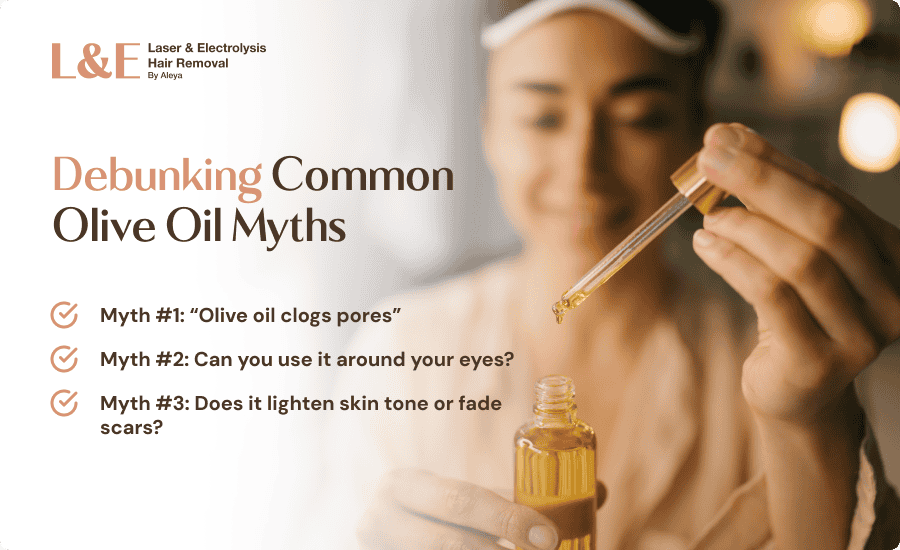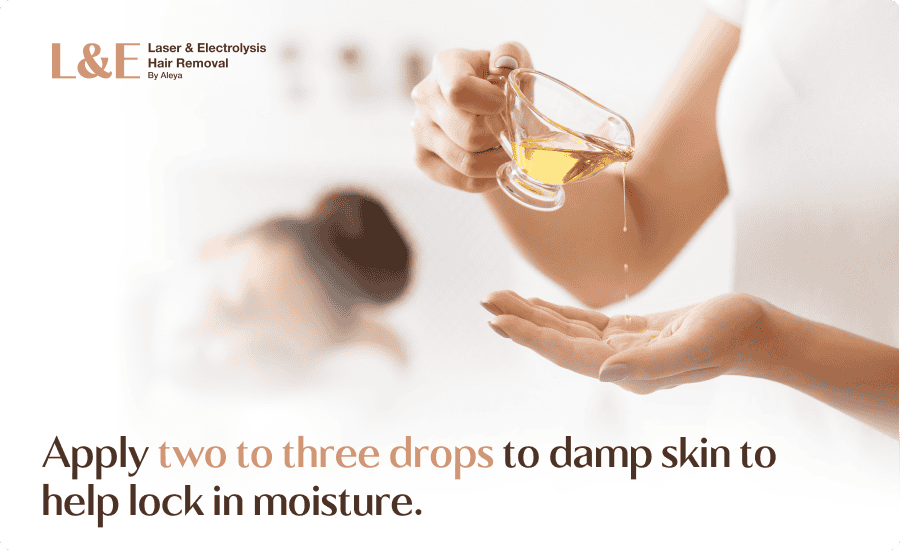Olive Oil for the Skin: Benefits, Myths Debunked & FAQs

Olive Oil for the Skin Explained: Key Takeaways
- Olive oil does a little bit of everything, from calming inflammation to adding glow and softening the signs of aging
- Extra virgin olive oil (EVOO) is the least processed and richest in skin-loving compounds like hydroxytyrosol and vitamin E
- Olive oil is rich in antioxidants, which help shield your skin from environmental stressors that can lead to fine lines and wrinkles
Olive oil has been a beauty go-to for thousands of years, with its use in skincare dating as far back to 4,000 BC.
Long valued for its nourishing and restorative properties, olive oil continues to hold a place in both traditional and modern beauty rituals.
From deep hydration to helping your skin look refreshed, olive oil’s charm comes from how naturally and effectively it gets the job done.
By the time you’re done reading this article, you will:
- Discover the top benefits of using olive oil for healthy, radiant skin
- Separate myth from reality: the facts you need to know about olive oil
- Learn simple, effective ways to incorporate olive oil to your daily skincare routine
- See how Laser by Aleya’s laser hair removal services can help you glow
Top Olive Oil Benefits for the Skin
Didn’t expect to see olive oil in your beauty lineup?
This kitchen staple does more than dress salads, as it’s also quietly working wonders in creams, scrubs, and serums.
Here’s why your skin might love it, too:
1. Deeply Moisturizes Dry, Itchy Skin
Olive oil is rich in vitamins and minerals that soften even the driest areas, like elbows, knees, and heels.
It works wonders on flaky, irritated skin, but you only need a few drops. Any more and your skin may feel greasy instead of refreshed.
2. Helps Calm Acne and Inflammation
It might feel counterintuitive to put oil on oily or acne-prone skin, but olive oil contains hydroxytyrosol, a powerful antioxidant with anti-inflammatory properties.
This natural compound can support healing and calm irritated skin, reducing the likelihood of future breakouts.
The key is to use it sparingly, just a drop or two, so you don’t clog more pores!
3. Improves Elasticity and Minimizes Stretch Marks
A friend once told me she made it through three pregnancies without a single stretch mark by massaging olive oil onto her belly every night.
She is far from the only one; women have been using this trick for generations.
Olive oil’s rich blend of vitamins, antioxidants, and fatty acids can support skin elasticity, making it more resilient and less prone to developing stretch marks over time.
In fact, a recent study found that phenolic compounds in extra virgin olive oil significantly stimulated human skin fibroblast activity, which plays a key role in tissue repair and regeneration.
4. Soothes Sunburn and Skin Irritation
Got a little too cozy with the sun or just finished a laser hair removal session? Olive oil to the rescue!
This skin-soothing superhero helps calm redness, reduces inflammation, and even eases the discomfort of ingrown hairs.
Just lather on a light layer for instant “ahh” without annoying your already-sensitive skin.
5. Defends Against Premature Aging
Thanks to its high antioxidant content, olive oil helps protect your skin from environmental damage that leads to fine lines and wrinkles.
It doesn’t erase time, but it can certainly help slow it down.
Extra virgin olive oil is also loaded with antioxidants like vitamin E and polyphenols that help brighten dull skin.
By locking in moisture and fighting oxidative stress, it gives your complexion a soft, healthy glow.
6. Gently Removes Makeup (and Grime)
Olive oil works wonders as a natural makeup remover.
It breaks down stubborn products, such as mascara, sunscreen, even long-wear foundation, without stripping your skin of its natural moisture, leaving it soft, nourished, and squeaky clean.
Just massage in a few drops and wipe clean with a warm, damp cloth.
Common Myths About Olive Oil for the Skin
There’s a lot of buzz about olive oil for skin; but not all of it holds up. Let’s clear up a few myths.
Myth #1: “Olive Oil Clogs Pores”
This one is partly true. Olive oil has a comedogenic rating of 2 (indicating how likely an ingredient is to clog pores), which means it can clog pores for certain skin types, especially oily or acne-prone skin.
However, if you have dry or combination skin, it’s usually well-tolerated when used in small amounts.
Start with just a few drops on clean, damp skin, and see how your skin reacts.
Not sure? Patch test first, or try it on your body before using it on your face.
Myth #2: Can You Use It Around Your Eyes?
Yes, but with care. Olive oil is packed with antioxidants and fatty acids that can nourish and hydrate delicate skin.
It’s also great at removing stubborn eye makeup.
Still, the skin around your eyes is extra sensitive, so use a tiny amount, apply gently, and stop if you notice any irritation or puffiness.
Myth #3: Does It Lighten Skin Tone or Fade Scars?
Not exactly. Olive oil won’t bleach your skin or erase deep scars, but it can improve overall tone and texture.
Thanks to its antioxidants like vitamin E and polyphenols, it supports healing, softens dark spots, and helps the skin look smoother over time. Think of it as a gentle enhancer; not a quick fix.

Types of Olive Oil and Why Extra Virgin Is Best
Olive oil might seem like a kitchen staple, but when it comes to your skin, the type you use makes a surprising difference.
Let’s break down what’s really in that bottle.
- Extra virgin olive oil (EVOO): This is the highest quality and least processed form. It’s cold-pressed without heat or chemicals, so it retains the most antioxidants, vitamins, and fatty acids that nourish your skin.
- Virgin olive oil: Still a decent option, but slightly more processed than EVOO and contains fewer nutrients.
- Refined olive oil: Often stripped of many beneficial compounds through heat and chemical processing. It’s best reserved for cooking, not your skin.
Why EVOO wins for skincare: It contains powerful compounds like hydroxytyrosol, vitamin E, and squalene, all of which hydrate, protect, and heal the skin.
Look for labels that say “cold-pressed” and “organic” for the cleanest product.
How To Use Olive Oil in Your Skincare Routine
Depending on your routine (or mood), there are a few creative ways to put olive oil to work:
- As a moisturizer: Apply two to three drops to damp skin to lock in hydration. Great for dry patches or nighttime use.
- To cleanse your skin: Massage a few drops into your skin to dissolve dirt, makeup, and sunscreen. Wipe with a warm, damp cloth.
- For body care: Mix with sugar or sea salt to make a DIY exfoliating scrub, or use it alone on rough spots like knees, heels, and elbows.
- As a lip balm: Gently rub into dry cuticles or chapped lips for quick relief.
Aleya’s tip: Start small! A few drops go a long way, especially on the face.

Get Longer-Lasting Smoothness With Laser Hair Services at Laser by Aleya
Not into the DIY route? While olive oil offers beautiful benefits for the skin, it won’t stop hair from growing back.
If you’re looking for a more lasting solution, Laser by Aleya offers expert, and surprisingly affordable, laser hair removal treatments that leave your skin smooth, stubble-free, and glowing (yes, we even have student discounts!)
Aleya uses the Lumenis Diode LightSheer, a clinically trusted laser system known for its precision, speed, and comfort, making it ideal for achieving long-lasting hair removal results with minimal downtime.
Olive Oil for the Skin: FAQs
Is olive oil good for your face?
Yes, olive oil can be good for your face when used properly and in moderation.
Packed with antioxidants (like vitamin E and polyphenols) and healthy fats, it nourishes, hydrates, and protects the skin.
However, it might not be everyone’s match.
If you have acne-prone or oily skin, olive oil can sometimes clog pores or trigger breakouts, especially if you don’t rinse it off thoroughly after using it.
What does olive oil do for your skin?
Thanks to its all-natural goodness, it’s especially helpful for:
- Moisturizes deeply: It can help soften and hydrate the skin
- Fights free radicals: The antioxidants in olive oil help combat oxidative stress, potentially slowing signs of aging
- Enhances skin barrier: It supports the skin’s protective barrier, helping it retain moisture and stay resilient
- Heals and calms: Its anti-inflammatory and antibacterial properties may aid in calming irritation and minor wounds or burns
Can I apply olive oil on dark armpits?
Yes, you can use olive oil on dark underarms.
It contains antioxidants like vitamin E and polyphenols that help nourish the skin and soothe irritation.
Who should (and shouldn’t) use olive oil on their skin?
Olive oil can be amazing for some, but it’s not ideal for everyone. Here’s what to consider:
Ideal for:
- Dry, flaky, or mature skin: Its emollient texture locks in moisture and helps repair the skin barrier.
- Irritated or inflamed skin: The anti-inflammatory compounds can calm redness and promote healing.
Use with caution if you have:
- Acne-prone or oily skin: Olive oil is comedogenic for some people, meaning it can clog pores and trigger breakouts.
- Sensitive or reactive skin: Always do a patch test. Even natural ingredients can cause reactions.
![Laser Hair Removal Areas: A Side-by-Side Comparison [+ FAQs]](https://www.laserbyaleya.com/wp-content/uploads/2026/02/laser-hair-removal-areas-hero-image-768x469.png)

![Can You Do Laser Hair Removal on Dry Skin and Hair? [+ FAQs]](https://www.laserbyaleya.com/wp-content/uploads/2026/02/dry-skin-and-hair-hero-image-768x469.png)